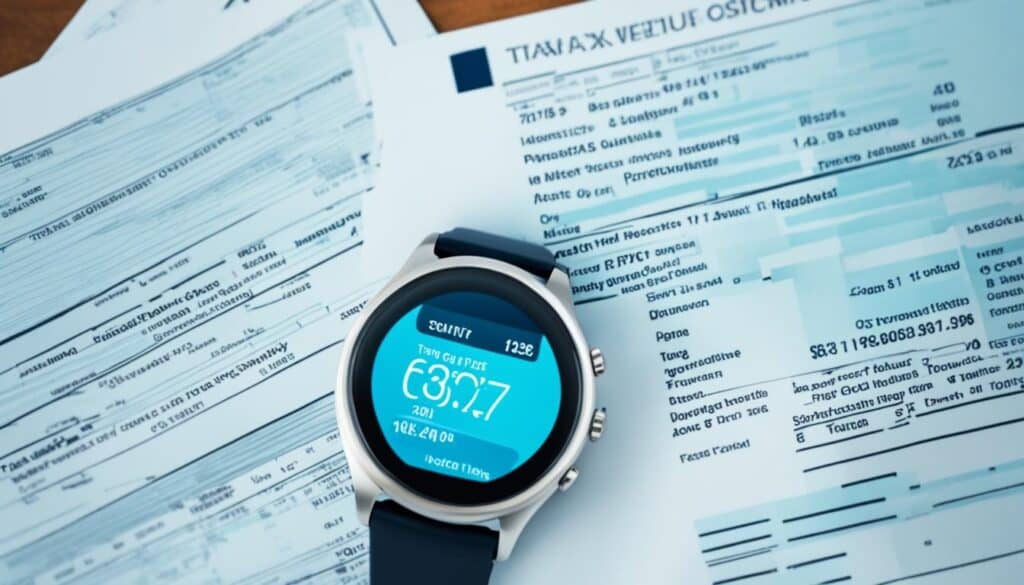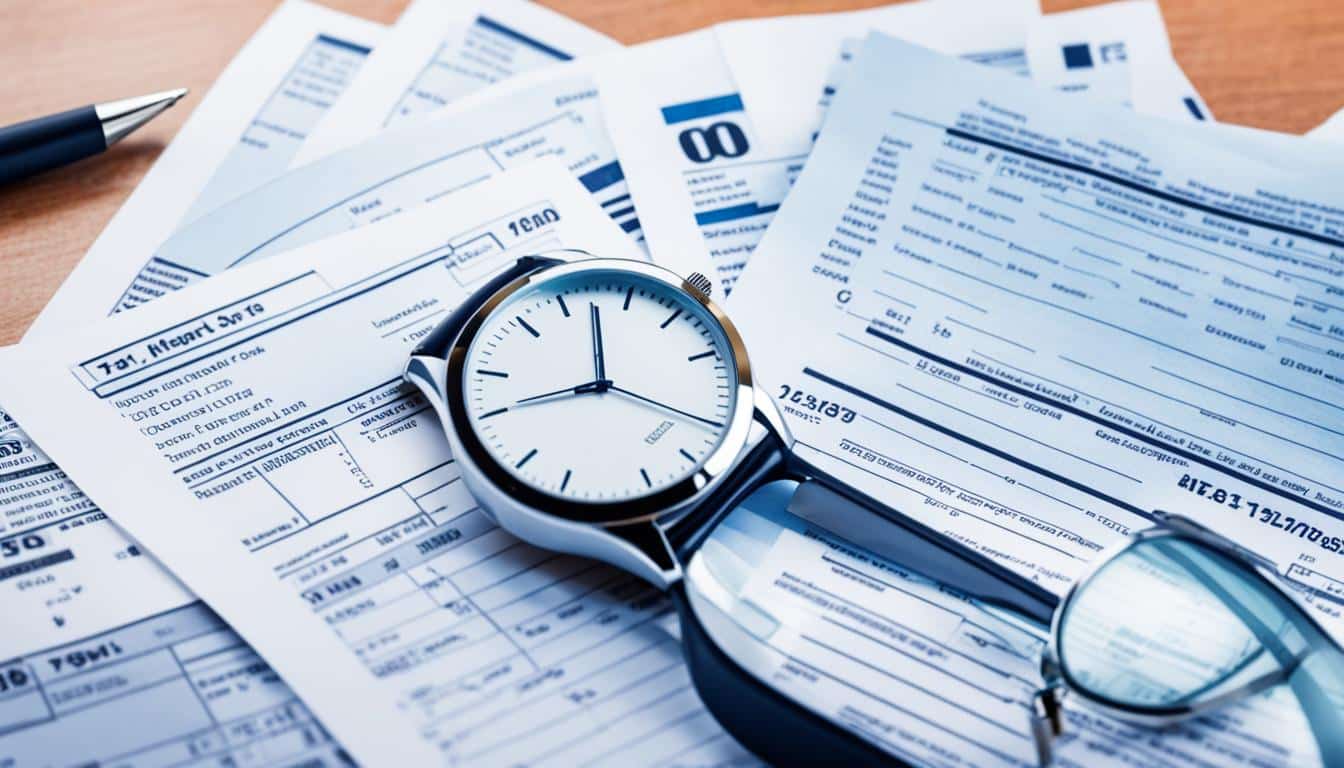Are you wearing a smart watch on your wrist right now? If so, you’re not alone. Smart watches have become increasingly popular in recent years, with their sleek designs and convenient features. But did you know that your smart watch could potentially be tax deductible?
Imagine this: you’re a freelance photographer, and you’ve just landed a gig shooting a high-profile event. As you capture stunning images of the night, your smart watch quietly buzzes with notifications of incoming emails from potential clients who are impressed by your work. You quickly respond to their messages, showcasing your professionalism and promptness.
This scenario highlights the business value of a smart watch. Its functionalities, such as calendar alerts, business calls, and work email access, can greatly enhance your productivity and even lead to increased sales. But what about the tax implications?
Key Takeaways:
- Smart watches can potentially be tax deductible if they are considered ordinary and necessary business expenses.
- The exact deductibility of a smart watch will depend on the extent of its business use and should be discussed with a tax professional.
- Consulting with a tax professional is recommended for maximizing the potential tax benefits of using a smart watch for business purposes.
- Smart watches can be considered similar to cell phones in terms of tax deductibility.
- Keep proper records to substantiate smart watch expenses and comply with IRS rules.
IRS Rules on Smart Watch Deductions
While the IRS has not specifically addressed the tax deductibility of smart watches, there are certain guidelines that can help you understand the potential tax implications. Under the IRS Code, any expense that is ordinary and necessary for a business is typically deductible, including expenses related to telecommunications equipment.
Smart watches offer a range of features that can be beneficial for business purposes. From calendar alerts and business calls to access to business-friendly apps, these functionalities can enhance your business productivity and sales. However, it’s important to note that the deductible amount will depend on the business use of the smart watch’s functions.
The IRS may consider smart watches as “Listed Property,” which requires strict proof of evidence for business use. To ensure that you can claim at least a portion of the smart watch as a deductible expense, it’s recommended to consult with a tax professional who can provide detailed guidance based on your specific circumstances.
While the IRS rules on smart watch deductions may not be crystal clear, the general principle is to consider the ordinary and necessary nature of the expense for your business. By keeping accurate records and seeking professional advice, you can navigate the smart watch tax implications and make informed decisions regarding your tax deductions.
Tax Benefits of Smart Watches
Are you aware of the tax benefits that come with utilizing smart watches for your business? Not only can these nifty gadgets enhance your productivity, but they can also provide potential tax savings. By treating the cost of a smart watch as a deductible business expense, you can reduce your taxable profits, thereby lowering your tax liability and increasing your net profits. While the specific deductibility of a smart watch may vary depending on individual circumstances, such as the nature of your business and the extent of its use, claiming it as a deductible expense can result in significant tax benefits.
To make the most of these tax benefits, it is crucial to keep proper records and consult with a tax professional. They can guide you through the process and help you maximize your tax savings. Whether you use your smart watch for scheduling appointments, managing business calls, or accessing business-related apps, it’s essential to demonstrate its relevance to your business operations.
With the tax benefits that smart watches can bring, it’s time to take advantage of them and put money back into your pocket. Consult with a tax professional today to ensure you’re making the most of this deductible expense.
Maximizing Smart Watch Tax Savings
- Track and record business use: Keep detailed records of how often you use your smart watch for business purposes. This can include tracking the number and duration of business calls, appointments, emails, and any other relevant activities.
- Separate personal and business use: If you use your smart watch for both personal and business purposes, it’s important to maintain a clear separation. Make sure to allocate and document the business-related use separately to accurately calculate the deductible expense.
- Consult a tax professional: To ensure you’re correctly claiming the tax benefits of your smart watch, seek guidance from a knowledgeable tax professional. They can provide you with personalized advice based on your specific business circumstances.
| Smart Watch Tax Benefits | Smart Watch Tax Savings | Smart Watch Deductible Expense |
|---|---|---|
| Reduces tax liability | Increases net profits | Proper record-keeping is essential |
| Enhances business productivity | Maximizes tax savings | Allocate business use accurately |
| Relevance to business operations | Consult a tax professional | Ensure compliance with tax regulations |
Smart Watches and Cell Phone Expenses
When it comes to the expense of smart watches, the tax implications are similar to those of cell phones. Under the Small Business Jobs Act of 2011, cell phones were removed from the “listed property” list, allowing for 100% deduction of cell phone expenses if certain criteria are met. The good news is that the same criteria can potentially apply to smart watches as well.
If your smart watch is critical to the operation of your business and the expense is reasonable for the type of business you have, you may be able to deduct a portion or even the full cost of the smart watch. However, there is one important requirement: you must have a separate cell phone for personal use.
If you have family members who legitimately work in your business and also need to use a smart watch for business operations, their smart watches can also be deductible. Just make sure they have a valid role in your company and that their use of the smart watch is for business purposes only.
Consulting with a tax professional is highly recommended to determine the specific tax implications of deducting smart watches and to ensure compliance with IRS rules. They can provide personalized guidance based on your unique situation and help you maximize the tax benefits while staying on the right side of the law.
Now that you have a better understanding of the tax implications surrounding smart watches and cell phone expenses, let’s explore the tax benefits of smart watches in more detail.
But before we move on, take a moment to check out this sleek and stylish smart watch:

Smart Watches vs. Cell Phones – Tax Deductibility
| Criteria | Smart Watches | Cell Phones |
|---|---|---|
| Must be critical to the operation of the business | ✔️ | ✔️ |
| Expense is reasonable for the type of business | ✔️ | ✔️ |
| Separate cell phone for personal use | ✔️ | ✔️ |
| Usage by family members legitimately working in the business | ✔️ | N/A |
| Deductibility | Partial or full deduction | 100% deduction |
Smartphone Deductibility for Limited Companies
As a limited company, you have the opportunity to deduct the costs of smartphones and other smart devices from your tax bill, potentially reducing your taxable profits and decreasing your company’s tax liability. However, it’s important to understand the requirements for claiming these expenses.
For a smartphone expense to be deductible, it must be incurred wholly and exclusively for the purpose of your business. This means that the costs must be necessary for the operation of your business and not for personal use. If you have a separate mobile phone that is used solely for business purposes, you can typically fully claim the cost as an expense.
If you have a single phone that is used for both personal and business purposes, you can still claim a proportion of the cost based on the usage split.
| Usage Split | Deductible Percentage |
|---|---|
| 70% business / 30% personal | 70% |
| 50% business / 50% personal | 50% |
| 30% business / 70% personal | 30% |
To ensure you can claim these expenses, it is crucial to maintain adequate records that clearly demonstrate the business-related use of the smartphone or smart device. This includes keeping track of calls, messages, and other activities that are directly related to your business operations. Consulting with a tax professional can provide further guidance on deducting smart devices against your limited company tax bill.
Smartwatch Deductibility for Limited Companies
When it comes to the deductibility of smartwatches for limited companies, the key consideration is whether they are necessary for your business. While smartwatches may not have the same level of necessity as smartphones, they can still be considered as deductible expenses if they are essential for specific business purposes.
Take, for example, an app developer who needs to test how their developed apps will function on a smartwatch. In this case, the smartwatch can be seen as a crucial tool for understanding the user experience and ensuring optimal performance.
However, it’s important to note that proving a smartwatch’s sole use for business purposes can be challenging. To navigate this gray area effectively and determine the best approach, it is highly recommended to consult with a tax professional who can provide expert guidance tailored to your specific situation.
In certain scenarios, it may be more advantageous to purchase a smartwatch personally rather than as a limited company expense to avoid potential tax issues altogether. Thus, carefully assessing the tax implications and seeking professional advice will help you make an informed decision that aligns with both your business needs and financial goals.








